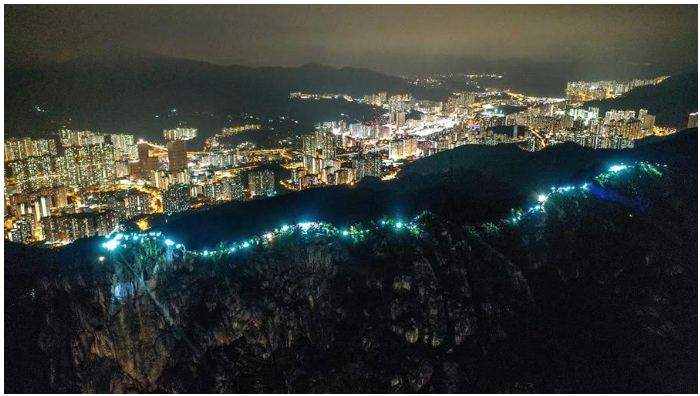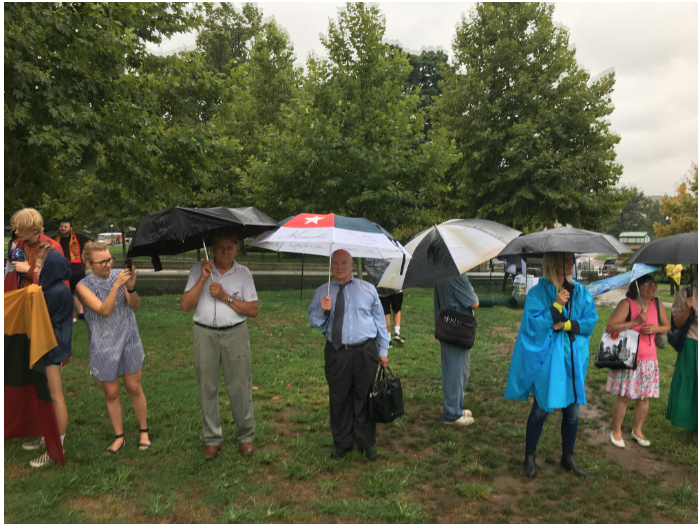"The struggle of man against power is the struggle of memory against forgetting." - Milan Kundera
Friday marked two anniversaries. Friday was the "Day of Remembrance for Victims of Totalitarian Regimes," and it was also a day to celebrate the "Baltic Way." These two observances are connected through history.
Eighty years ago on August 23, 1939 Josef Stalin, the leader of the Soviet Union, the first communist regime, signed a treaty with Adolph Hitler, the leader of Nazi Germany it was named after their respective foreign ministers, V.M. Molotov and Joachim von Ribbentrop, as the Molotov-Ribbentrop Pact. Eventually it also became known as the Hitler-Stalin Pact.
Stalin present to witness the signing of the Molotov-Ribbentrop Pact on August 23, 1999
Nine days later on September 1, 1939 Nazi Germany invaded Poland and World War II started. Sixteen days later the Soviet Union exercising its secret agreement with the Germans invaded Poland from the East and met their Nazi allies on September 22, 1939 in a joint military parade in Brest-Litovsk to celebrate their victory.
230,000 Polish soldiers and officers and thousands of military service representatives were taken captive by the Soviets.
On March 5, 1940 the order to shoot the prisoners was signed by seven members of the All- Union Communist Party (Bolsheviks) authorities: Joseph Stalin, Lavrentiy Beria (proposer), Kliment Voroshilov, Vyacheslav Molotov, Anastas Mikoyan, Mikhail Kalinin and Lazar Kaganovich. Thousands of Polish Army officers and intellectual leaders were taken into the Katyn Forest near Smolensk in the Soviet Union, shot in the back of the head or in the neck and buried in mass graves.
Months later, the Soviet Union invaded and annexed the Baltic States in June 1940.
This arrangement only ended on July 22, 1941 when the Nazis double crossed their Soviet allies and launched Operation Barbarossa, the invasion of the Soviet Union. This alliance cost 22 to 28 million Russian lives in World War Two.
However it also ended with the Soviet Union retaking and absorbing the Baltic states for decades, and Poland firmly under Soviet control as a satellite state. This was a legacy of the Molotov-Ribbentrop Pact that did not end until fifty years later.
On June 4, 1989 the Solidarity labor movement won in free elections and the Polish people finally regained their sovereignty from Soviet domination.
The Baltic Way protest on August 23, 1999 brought an end to one legacy of Molotov Ribbentrop
Thirty years ago today two million Latvians, Lithuanians and Estonians joined hands together in a giant human chain stretching 370 miles on August 23, 1989. Fifty years to the day after the treaty that brought them so much grief had been signed. This non-violent act of defiance was a crucial event that led to the liberation of the Baltic States and their restored independence.
Hong Kongers joined hands over 44 kilometers today across the city and over Lion Rock mountain
Today, across the world from Hong Kong to Washington DC people gathered together and joined hands to recreate this human chain in a celebration of freedom, democracy, rule of law and self-determination. In Hong Kong people formed a 44 kilometer human chain across the city, and over the Lion Rock Mountain. In Washington D.C. a delegation from the Center for a Free Cuba led by former Cuban political prisoner Basilio Guzmán and former CFC Executive Director Frank Calzon formed part of the 800 person chain, under pouring rain, on the west side of the U.S. Capitol.
Ex-Cuban political prisoner Basilio Guzmán and Frank Calzon attend Baltic Way protest at the U.S. Capitol
This is an important moment to hold such acts of remembrance because Russia is engaged in a campaign to rewrite this history, justifying the Molotov-Ribbentrop pact to whitewash Josef Stalin's crimes. This is also why thecountries impacted by the Hitler-Stalin pact needed to issue a joint statement today calling upon "the governments of all European countries to provide both moral and material support to the ongoing historical investigation of the totalitarian regimes. By acting in a concerted manner, we can counter more effectively disinformation campaigns and attempts to manipulate historical facts."
Communist collaboration did not end with the Hitler-Stalin Pact. Following the end of World War II the Soviet Union was funding Neo-Nazi parties in West Germany in an effort to undermine their democracy. They backed theSocialist Reich Party in 1950 that worked with the Communist Party of Germany.
Fidel Castro in 1962 when Otto-Ernst Remer was selling him weapons
In the early 1960s the Nazi who saved Adolf Hitler's Third Reich in 1944, Otto-Ernst Remer, had contacts with and assisted Fidel Castro in Cuba with the purchase of weapons. He sold the Cuban dictator 4,000 pistols. Castrorecruited former Nazi SS Waffen members to train Cuban troops The German foreign intelligence agency, Bundesnachrichtendienst (BND), reported that "evidently, the Cuban revolutionary army did not fear contagion from personal links to Nazism, so long as it served its objectives."
This legacy of Nazi and Communist collaboration can be observed today in the repressive tactics carried out by the Castro regime's intelligence agents in Venezuela, Cuba, and elsewhere.
Joint Statement by Estonia, Latvia, Lithuania, Poland and Romania on the occasion of 80 years since the signing of Molotov-Ribbentrop Pact
Molotov-Ribbentrop pact. Source: SA "Ajalooline mälu"
August 23 will mark 80 years since the signing of the Molotov-Ribbentrop Pact between the Soviet Union and Nazi Germany that sparked World War II and doomed half of Europe to decades of misery. The Pact contained the secret protocol which effectively carved up Eastern Europe into spheres of influence.
This is why on this day proclaimed by the European Parliament as a European Day of Remembrance for Victims of Totalitarian Regimes we remember all those whose deaths and broken lives were a consequence of the crimes perpetrated under the ideology of Nazism and Stalinism.
Pain and injustice will never fall into oblivion. We will remember.
Remembering and commemorating past horrors gives us the knowledge and strength to reject those who seek to revive these ideologies or who seek to exonerate these ideologies of their crimes and culpability. The memory of the victims compels us to promote historical justice by continuing research and raising public awareness of the totalitarian legacy on the European continent.
The basis for sustainable conciliation and building a common future is justice and objective truth. Victims of totalitarian crimes have a right to justice. Unfortunately, the practice of investigating and prosecuting the crimes of totalitarian regimes has been insufficient and inconsistent across countries.
We call upon the governments of all European countries to provide both moral and material support to the ongoing historical investigation of the totalitarian regimes. By acting in a concerted manner, we can counter more effectively disinformation campaigns and attempts to manipulate historical facts.
We must stand together against totalitarianism. A clear and firm position of the international community will pave the way to further reconciliation.
We are confident that today's Europe is a safe place for all peoples, and ready to resolutely resist any kind of injustice. We believe that Europeans will never tolerate totalitarianism or genocide against any people.
Our countries have been reborn as free and democratic nations after decades of totalitarian rule. Thirty years ago, our nations started the democratic transformations that eventually made us equal and vigorous members of the European Union. Our countries are determined to continue working with our partners in Europe and around the world so that the horrors of the past never re-emerge.
Minister of Foreign Affairs of the Republic of Estonia Urmas Reinsalu
Minister of Foreign Affairs of the Republic of Latvia Edgars Rinkēvičs
Minister of Foreign Affairs of the Republic of Lithuania Linas Linkevičius
Minister of Foreign Affairs of the Republic of Poland Jacek Czaputowicz
Minister of Foreign Affairs of Romania Ramona-Nicole Mănescu







